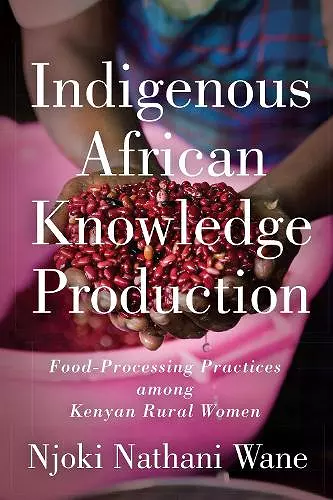Indigenous African Knowledge Production
Food-Processing Practices among Kenyan Rural Women
Format:Hardback
Publisher:University of Toronto Press
Published:28th May '14
Currently unavailable, and unfortunately no date known when it will be back

"Njoki Nathani Wane addresses an important topic and proffers a powerful argument that places women at the centre of local knowledge production. She does an excellent job in representing Embu women's views and their engagement with traditional technologies." -- Isidore Lobnibe, Department of Anthropology, Western Oregon University "Little has been published on African women's indigenous knowledge systems and food production. Wane's book is an important contribution to the research in this area." -- Patricia Clark, Director, African and African-American Studies, SUNY Oswego
In Indigenous African Knowledge Production, Njoki Nathani Wane uses food-processing practices – preparing, preserving, cooking, and serving – as an entry point into the indigenous knowledge of the Embu and the role that rural Embu women play in creating and transmitting it.
Among the rural Embu people of Eastern Kenya, teaching and learning are not purely institutional activities. Instead, knowledge is passed from generation to generation alongside the most mundane activities. In Indigenous African Knowledge Production, Njoki Nathani Wane uses food-processing practices – preparing, preserving, cooking, and serving – as an entry point into the indigenous knowledge of the Embu and the role that rural Embu women play in creating and transmitting it.
Using personal narratives collected during several years of field research in Kenya, Wane demonstrates how Embu women use proverbs, fables, and folktales to preserve and communicate their world-view, knowledge, and cultural norms. She shows how this process preserves Indigenous knowledge devalued by the colonial and post-colonial educational systems, as well as the gendered dimension of the transmission process.
Wane’s book will be useful not just to those studying development and education in Africa, but also to all those interested in questions of how to preserve and recover local cultural knowledge.
ISBN: 9781442648142
Dimensions: 236mm x 160mm x 18mm
Weight: 360g
144 pages